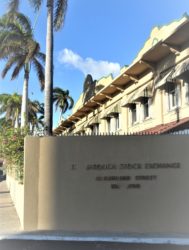The principal objective of the Government of Jamaica’s programme is to reduce the national debt and raise the sustainable growth rate of our national output.
The governor of the Bank of Jamaica, Bryan Wynter, stated in a recent address at a JMA’s 2014 Economic Forum, that the Government has committed to implementing revenue, expenditure and debt management measures to ensure that the debt goes down in relation to GDP. This commitment entails the achievement of annual primary surpluses of 7.5% of GDP over the life of the programme. The governor went on to outline other measures that are to be put in place to achieve the main objectives.
“With this,” he stated, “the borrowing need of the Government has fallen sharply, which is leading to a steady reduction in the debt to GDP ratio to below 100% by 2020. Government intends to make the current fiscal responsibility framework stronger by developing binding fiscal rules. This will increase transparency, lock in the gains of fiscal consolidation and ensure that budgets will be sustainable even beyond the end of the four-year IMF agreement.
“A central plank of the programme is the implementation of structural reforms aimed at creating an environment supportive of economic growth. One of the main structural reforms to which the Government has committed is the improvement of the tax system, including tax administration.
“Fiscal incentives legislation was also passed in December which overhauls and simplifies decades of tax law to the advantage of productive businesses.
“To kick-start growth, the government has started to implement catalytic, strategic, public-private investments. Already, the government has initiated production in six agro-parks, aimed at import substitution. The objective is to develop a total of nine such parks by the end of 2014.
“The GOJ is also committed to improving the competitiveness of the economy through legislative and administrative changes. Additionally, amendments to the Companies Act were passed which streamline the business registration process through the use of a multi-purpose registration instrument. A bill to modernise our bankruptcy rules, the Insolvency Bill, was also tabled in Parliament.
“The Government is in the process of establishing a Port Community System to electronically integrate and streamline export and import procedures. It is also moving to establish more flexible work arrangements and improve access to skills training. Furthermore, initiatives to achieve energy diversification and conservation are in progress.
“Supporting these reforms will be the preservation of a stable macroeconomic environment through sound monetary and fiscal policies. Inflation is expected to decline over the medium term towards our long-run objective. This decline in inflation, in conjunction with a more competitive exchange rate, will foster increased price competitiveness of Jamaica’s exports of goods and services.
“Lower inflation will also allow Jamaican businesses to finance investments at lower interest rates. The reduction in fiscal deficits and the public debt will make more resources available to the productive sector and will complement Bank of Jamaica’s thrust to maintain single-digit inflation.
“The Government also committed to undertaking reforms which will increase the efficiency and competitiveness of the financial system and credit market. You may have seen in the media recently, where we committed to a timetable for raising the cap on investments in foreign securities from 5% of assets to at least 25% by end-2015 and removing it by end-2016, unless extraordinary circumstances require a reassessment. The drafting of Jamaica’s Omnibus Banking statute, which includes regulations to give consumers increased protection and to underwrite the regulatory basis for agency banking, is far advanced.
 “We are confident that we will be successful with the December test both with respect to the structural benchmarks and the quantitative performance criteria. More importantly, the Government is already looking ahead to the coming fiscal year with a view to crafting policies and commitments aimed at further improving the business climate in Jamaica and securing stronger growth.
“We are confident that we will be successful with the December test both with respect to the structural benchmarks and the quantitative performance criteria. More importantly, the Government is already looking ahead to the coming fiscal year with a view to crafting policies and commitments aimed at further improving the business climate in Jamaica and securing stronger growth.
“The economy began its recovery during the September quarter, registering growth of 0.5 per cent. We expect that growth of a little under 1.0 per cent will materialise for the fiscal year, in line with our projections.
“As the economy stabilises, the fiscal and external balances improve and the debt ratios are brought down towards sustainable levels, we should see the Government being able to address more effectively important social and developmental issues such as education and training and crime and social peace.”
Related posts | Ministry confirms deficit wipe out | Major cost input for production in 2013 | 2013 inflation 9.7%, worse than 2012










